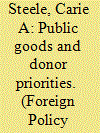| Srl | Item |
| 1 |
ID:
159576


|
|
|
|
|
| Summary/Abstract |
Over the past two decades, development assistance for health (DAH) has reached record levels. Yet, many developing states continue to struggle with diseases easily prevented and treated in industrialized states. Within the aid literature, DAH has historically been viewed as technical rather than political and has been largely disregarded. I argue that, like other forms of foreign aid, DAH may be subject to political influences; and that identifying those interests requires moving beyond dyad-level conceptualizations of political interests. I apply a public goods model to bilateral aid allocations for infectious disease control, using disease characteristics to specify recipients’ need and donors’ interests. I use an original dataset to model disease-specific aid allocations. The results suggest that, within the public goods setting of global disease control, bilateral donors allocate aid to maximize their own payoff. In addition, this analysis provides a theory-driven explanation for poor health outcomes in many developing countries where aid allocations fail to match need.
|
|
|
|
|
|
|
|
|
|
|
|
|
|
|
|
| 2 |
ID:
103303


|
|
|
|
|
| Publication |
2011.
|
| Summary/Abstract |
As democratization has advanced in the developing world, developed countries such as the United States have implemented explicit strategies of democracy promotion by providing assistance to governments, political parties, and other non-governmental groups and organizations through a variety of channels. This analysis examines the relationship between democracy support by the US Agency for International Development and democratization in the developing world between 1988 and 2001. In a model that examines the simultaneous processes linking democratization and democracy aid, we argue that carefully targeted democracy assistance has greater impact on democratization than more generic economic aid packages. We test the relationship in a simultaneous equation model, supplemented by several time-series cross-sectional regressions. Our data reveal a positive relationship between specific democracy aid packages and progress toward democracy. We conclude by weighing the implications of these findings for democratization and democracy promotion policies.
|
|
|
|
|
|
|
|
|
|
|
|
|
|
|
|